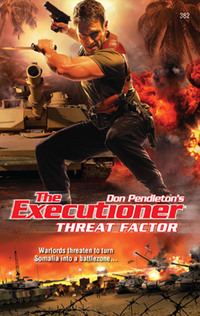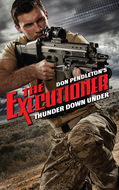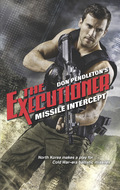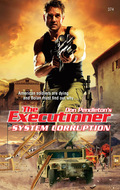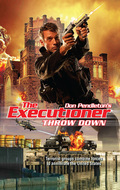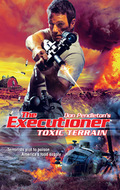Książki nie można pobrać jako pliku, ale można ją czytać w naszej aplikacji lub online na stronie.
Czytaj książkę: «Threat Factor»
Then the gates of hell opened up
The game was on, and the only way to win it was to charge on, straight ahead.
Bolan went through the curtain in a fighting crouch and dropped another adversary as his target tried to cock his AK-47. Shock was written on the gunman’s face as he went down.
The others started firing then, mostly without direction, making lethal noise as soldiers often did to keep the enemy at bay until they worked out what in hell was happening. The walls were being chipped and scarred by bullets, drilled through completely in places by the larger calibers.
Bolan had claimed the table of the second man he’d shot, flipped it to make a shield of sorts, but knew it wouldn’t serve him long or well. The first hits showered him with splintered wood, which meant that at least a couple of his enemies had seen him go to ground.
It was time to move.
But first, a little shock and awe.
Threat Factor
The Executioner ®
Don Pendleton’s
The meaning of good and bad, of better and worse, is simply helping or hurting.
—Journals
Ralph Waldo Emerson
1803–1882
Sometimes we have to fight evil with evil, fire with fire. Violence is the only language some predators understand, and I speak it fluently.
—Mack Bolan
THE MACK BOLAN LEGEND
Nothing less than a war could have fashioned the destiny of the man called Mack Bolan. Bolan earned the Executioner title in the jungle hell of Vietnam.
But this soldier also wore another name—Sergeant Mercy. He was so tagged because of the compassion he showed to wounded comrades-in-arms and Vietnamese civilians.
Mack Bolan’s second tour of duty ended prematurely when he was given emergency leave to return home and bury his family, victims of the Mob. Then he declared a one-man war against the Mafia.
He confronted the Families head-on from coast to coast, and soon a hope of victory began to appear. But Bolan had broken society’s every rule. That same society started gunning for this elusive warrior—to no avail.
So Bolan was offered amnesty to work within the system against terrorism. This time, as an employee of Uncle Sam, Bolan became Colonel John Phoenix. With a command center at Stony Man Farm in Virginia, he and his new allies—Able Team and Phoenix Force—waged relentless war on a new adversary: the KGB.
But when his one true love, April Rose, died at the hands of the Soviet terror machine, Bolan severed all ties with Establishment authority.
Now, after a lengthy lone-wolf struggle and much soul-searching, the Executioner has agreed to enter an “arm’s-length” alliance with his government once more, reserving the right to pursue personal missions in his Everlasting War.
Contents
Prologue
Chapter 1
Chapter 2
Chapter 3
Chapter 4
Chapter 5
Chapter 6
Chapter 7
Chapter 8
Chapter 9
Chapter 10
Chapter 11
Chapter 12
Chapter 13
Chapter 14
Chapter 15
Epilogue
Prologue
Indian Ocean
Captain Danilo Andreychuk was worried. He had watched a trawler keeping pace with the Vasylna for the better part of two hours. Examining the rusty hulk through his binoculars from half a mile away, he could not escape a sense that he was being stalked.
It was entirely reasonable that Captain Andreychuk feared treachery. These waters, off the east coast of Somalia, teemed with hijackers and pirates who liked nothing better than to prey on merchant ships—stealing their cargo, sometimes offering it back for ransom to the rightful owners and frequently committing acts of needless violence against the transport crews.
And the Vasylna was a prime target.
Her cargo was supposed to be a deep, dark secret, but Andreychuk knew that every ship afloat sprang leaks from time to time. Some leaks let water infiltrate the cargo holds, while others provided information to the sea wolves who paid well for tips involving profitable merchandise.
With the exception of his first mate, Mykola Shymko, the captain didn’t trust the other members of his crew as far as he could throw them—preferably overboard. They were a mixed lot, competent enough as long as he was watching them perform their duties, but he assumed that most of them were ex-convicts. Their crude tattoos spoke volumes with respect to lives pursued outside the law.
Andreychuk noted that the trawler had drawn closer while he was distracted by his private thoughts. He had been debating whether he should hail the other ship, when a gruff voice behind him asked, “Is something wrong?”
The captain turned to face his latest client, known to him as Grigory Glazkov. The man was Russian, with a military look about him—flinty eyes and roughly chiseled features set beneath a graying crew cut that was thinning at the crown.
“I hope not,” Andreychuk replied. “But maybe so.”
Glazkov had seen the trawler now and recognized its flag. “Liberian,” he noted.
“Maybe,” Andreychuk said. “Maybe not.”
Glazkov had to have known that many vessels listed in the Liberian International Ship & Corporate Registry were Liberian in name only, logged as a matter of convenience that frequently included tax evasion and concealment of the true owner’s identity. The trawler’s flag—resembling that of the United States, but with only one star in its blue canton, and eleven red-and-white stripes in its field instead of thirteen—told Andreychuk nothing.
“Can we outrun them, if need be?” Glazkov inquired.
Andreychuk shrugged and said the obvious. “She’s keeping up so far.”
They were two miles offshore from Bargaal, still some thirteen hundred miles from their intended destination of Mombassa, Kenya. Andreychuk had no idea how fast the nameless trawler could travel—and now he saw that it didn’t matter. “Speedboats!”
From Glazkov’s lips, it sounded like a curse.
And so it was.
Three sleek powerboats—one red, two white—had suddenly appeared from the trawler’s starboard shadow and were racing toward the Vasylna at full speed, fairly skimming across the ocean’s surface. Each carried five or six men, and Andreychuk didn’t need his binoculars to know they were armed.
“You can repel them, yes?” Glazkov demanded.
“Perhaps.” Andreychuk’s tone left no doubt of his skepticism.
Even as he spoke, the first speedboat reached the Vasylna, one of its passengers raising a stubby weapon to his shoulder and squeezing its trigger. With a muffled popping sound, a grappling hook hurtled over the Vasylna’s port-side railing and caught hold, trailing a crude rope ladder behind it.
“We must fight back!” Glazkov barked at him, reaching underneath his jacket to produce an automatic pistol.
“Not so fast, Comrade,” another voice said from behind the Russian.
Glazkov and Andreychuk turned as one, to find a stocky figure standing in the wheelhouse doorway. Mykola Shymko held a pistol of his own, aimed at the Russian’s head.
“Full stop, Captain, I think,” the first mate said.
So much for trust.
1
Mogadishu, Somalia
Mogadishu—or Muqdisho, in Arabic—was the crossroads of East Africa. Local natives opened seafaring trade with India in the first century, and later welcomed Portuguese merchants and seamen. Ali bin Said al-Busaid, the fourth sultan of Zanzibar, leased Mogadishu to Italy in 1892, while his successors sold it outright to Rome in 1905. Kenya captured the city in 1941, then yielded control to Great Britain from 1950 to 1960, with the advent of chaotic independence. But Somalia’s capital retained its Italian flavor, at least in the names of its streets. Italian coexisted with English, Arabic and Somali as one of Somalia’s four official languages.
Which explained why Mack Bolan, driving west from Aden Adde International Airport in a rented car, made his first turn on Via Medina, proceeding southwestard from there onto Via Londra and Via Roma.
He was headed downtown, toward the teeming heart of a city whose population exceeded two million. A recent sitrep out of Langley estimated that Mogadishans owned at least one million assault rifles, making their city the most heavily armed on Earth.
And they weren’t afraid to use those weapons, either. Street battles between rival warlords and criminal gangs were routine—so common, in fact, that the Western media rarely bothered to report a skirmish or bombing with less than a dozen slain victims.
In short, Bolan was headed into an active war zone—unarmed.
Fortunately, he should have no trouble finding military hardware in the city.
His destination, as luck would have it, lay at the very heart of Mogadishu’s urban battleground. The Bakaara Market was Somalia’s largest open market, and while relatively new—created under the Mohamed Siad Barre regime, in 1972—it had compiled an impressive record of outlaw activities. Aside from the selling of daily essentials, such as dietary staples, medicine and gasoline, the market had become a virtual arms dump since the Somalian revolution of 1986-92 and the ensuing civil war that had continued to the present day. Aside from standard small arms and explosives, Bolan understood that antiaircraft guns, mortars and other heavy weapons were available upon demand, for those with ready cash.
No problem getting strapped, then, even with his relatively pale skin working to his disadvantage in a country where Caucasians were often regarded as the enemy, regardless of their nationality.
The Bakaara Market’s other offerings included forged passports and other vital documents, prepared within minutes for buyers in a hurry, and counterfeit currency produced in such abundance that it sparked the collapse of the Somali shilling and forced a brief closure of the market in 2001. For months after the market reopened, its vendors had demanded U.S. dollars in place of their own nation’s worthless money.
Small wonder, then, that the Bakaara Market had witnessed repeated, brutal acts of violence. Sporadic firefights and RPG attacks made the market hazardous for merchants and patrons alike, while a series of combat-related fires had swept the ramshackle stalls between 2001 and 2007, claiming dozens of lives.
It sounded like a little bit of hell on Earth.
Unfortunately, it was also Bolan’s point of contact with a native ally he had never met, but whose local knowledge might prove critical to Bolan’s latest mission.
Might being the operative word.
Experience had taught the Executioner to deal with strangers at arm’s length, regardless of their prior endorsements by those whom he had cause to trust. That was true in the States, true in Europe, and doubly true in a place like Somalia, where decades of savage internecine warfare had replaced civilization with something close to anarchy.
As he approached Mogadishu’s Hamarwein Old Town, rolling north on Via Morocco, Bolan considered stopping off before his meet to buy a pistol and some ammunition, maybe add an SMG to his preliminary shopping list, but he was running late already with a flight delay in Cairo, and he didn’t want to leave his contact hanging any longer than he absolutely had to.
He’d memorized a recent photo of the man he was supposed to meet, Dirie Awaale Waabberi, and hoped he would be able to quickly spot his face out of a mob at the Bakaara Market. But Bolan knew from personal experience that Third World slums and marketplaces could overwhelm strangers without even trying.
Bolan himself was no stranger to Africa, per se, but he couldn’t pretend to pass for a native or long-term resident. He had been in and out of the continent on varied missions through the years, but governments and causes changed like the seasons. Africa’s only constants were physical beauty and stone-cold indifference to human survival.
So Bolan passed on pistol-shopping for the moment, and instead took his chances with mobility and instinct as he drove to meet a stranger who would either help him or betray him to his enemies.
As for those enemies themselves, a cautious man would say that they had Bolan hopelessly outnumbered and outgunned. But those who leaped to that conclusion didn’t know the Executioner.
DIRIE WAABBERI HAD a pistol of his own, but he wasn’t sure by any means that it would keep him breathing through the night. Dusk was approaching, and the floodlights mounted over the Bakaara Market were already lit, but he saw menace in the shadows between market stalls and in the eyes of strangers passing by on either side of him.
It was easy to die in Mogadishu. Anyone could sidle up to Waabberi in the crush of shoppers, slip a blade between his ribs or shoot him in the head, and who would care? Beyond a momentary ripple as he crumpled to the pavement, who would even notice?
On his way to the Bakaara Market, Waabberi had passed a small contingent of AMISOM—African Union Mission in Somalia—peacekeepers, instantly recognizable wearing their green berets and green armbands. They carried weapons but were virtually barred from using them except in the last straits of self-defense. Yet, even then, being outnumbered some 750 to one by Mogadishans who often possessed superior weapons, what chance did they have? If they kept any peace in the city, Waabberi had yet to observe it.
They would not save him, if he had been marked for death by enemies.
Waabberi had survived to celebrate his twenty-ninth birthday, just two weeks earlier, but he was ever conscious of the fact that it might be his last. The course of action he had chosen, working with a foreign stranger to defy powerful foes, could prove to be a fatal mistake.
But he was hopeful, all the same.
A man had to do something when confronted by such wickedness, or else humanity itself was lost.
Waabberi had never experienced peace. Somalia’s last elected government had collapsed four years before he was born, eclipsed in turn by military dictatorship, rebellion, civil war and eventual chaos, but he understood that some nations—even in impoverished, strife-torn Africa—enjoyed a measure of stability. If he could help his homeland move in that direction, even if he did not live to see it triumph, then Waabberi felt his life would at least count for something.
But dedication did not exempt him from fear.
Of late, Waabberi had felt that he was being followed. Granted, he could not have proved it. Stopping suddenly on sidewalks, peering into windows for reflected glimpses of a stranger stalking him, he had seen nothing that would stand as evidence. Perhaps he had grown paranoid, which on the deadly streets of Mogadishu was no more than a survival mechanism.
Still, Waabberi had a sense of being watched and shadowed. He was doubly cautious in communicating with his CIA control agent, avoiding any face-to-face contact, shunning even the use of public telephones. When messages were passed, he went the long way around to dead drops, using every trick at his disposal to get rid of followers. Sometimes he felt absurd, and yet he persevered, fully aware that enemies could strike the moment he relaxed his guard.
Or even now, when he was poised at full alert.
Waabberi wished that he knew more about the stranger he’d been asked to serve as translator and guide. The man was white and used the name Matthew Cooper, although Waabberi would have bet a year’s income that he’d been christened something else.
This Cooper was supposed to be “a specialist,” which could mean anything in cloak-and-dagger terms. Given the time and place, the opposition he’d be facing, it was safe to guess that mayhem was among his specialties.
How else could the American expect to tackle Mogadishu’s warlords and survive?
As far as the specifics of his mission, no details had been forthcoming. It was strictly “need-to-know,” a bit of hedging by Waabberi’s CIA control against the possibility that he would be abducted and interrogated by some unnamed enemy.
And so, Waabberi came to the Bakaara Market with a pistol tucked under his belt. It was a big Beretta Model 92, dragging his pants down on the left and covered by the loose tail of his baggy shirt, positioned for a cross-hand draw.
Waabberi guessed that most of those around him in the market crowd were similarly armed. Reliance on a gun or knife for personal defense was something every Mogadishan child learned at an early age from parents, older siblings, or the acts of violence they witnessed for themselves. Survival of the fittest—or the fastest—had replaced the rule of law so long ago that only those of middle age or older could recall a better time.
But if Waabberi’s life was dangerous before, he knew that the real peril would begin this day, within the next few minutes. When he met the stranger from America—assuming that the man actually showed up—Waabberi’s danger level would increase dramatically.
He would no longer be just an observer of the violence around him, someone who reported back in secret and was paid in U.S. dollars for his trouble. From the moment he laid eyes on Cooper’s face and shook his hand, Waabberi knew he would become a target.
Any second now.
SIMEON BOORAMA WAS TIRED of waiting. He had spent the best part of a week trailing his target, wishing he could simply kill the man and be done with it, reining in his agitation with great effort.
Now, the job was nearly done. This day Boorama was expected to eliminate his mark—but still, he had to stand and wait, until some other man arrived. It was a two-for-one, and his instructions were exremely clear: Miss either one, and it would be his own head on the chopping block.
Preferring overkill to failure every time, Boorama had collected five more soldiers for the final act. They melded perfectly into the mob of shoppers thronging the Bakaara Market on this absolutely normal evening. Their weapons were half-heartedly concealed, and in the absence of police patrols they passed unnoticed among others who were similarly armed.
Boorama watched his target, drifting among the produce stalls that offered maize, beans, sorghum, peanuts, wheat and sesame. A few aisles over, someone was cooking sambuusa spiced with green peppers that made his mouth water. Boorama contented himself with a cup of sweet lassi—yogurt and water, flavored with mango and sugar—while stalking his man.
A time or two during the long week of surveillance, he’d been almost certain that he had been spotted. Once, Dirie Waabberi had turned in the aisle of a grocery store and stared at Boorama directly, but Boorama had brushed on past him, nearly touching shoulders with a muttered “Scusi,” and moved on.
Apparently no harm had been done, since the target had not varied his routine over the next few days. Granted, Waabberi had made some basic efforts to evade surveillance, but Boorama had assistants on the case by then, and the man could not shake them off, no matter what he tried.
And finally, the end was near.
Boorama hoped his next assignment would be simpler. In and out, an easy execution without all the spying nonsense complicating every move he made. Of course, he offered no complaints to his superiors—that would have been the next best thing to suicide.
Boorama understood he was just a cog in the machine, expendable and easily replaced. With nearly half of all adult Somalis unemployed, and those with jobs averaging less than one thousand U.S. dollars per year in income, thousands of young men literally would have killed to claim Boorama’s job.
Somali lives came cheap, Boorama’s own no less than those he had extinguished on behalf of his employers. He’d lost count along the way, but knew his willingness to kill upon command was the only thing that kept him earning money—kept him breathing.
Boorama thought he might even have killed his own kin in order to survive. Waabberi’s life meant less than nothing to him, in the larger scheme of things.
His choice of weapons for the job was a Benelli CB-M2 submachine gun, an Italian 9 mm weapon that measured less than eighteen inches long with its butt folded. He had loaded the piece with a 30-round box magazine and stuffed his pockets with spares, just in case.
Not that he planned to miss.
Up close, the way Boorama liked to work, he would cut Dirie Waabberi and his nameless friend in two before they even recognized the danger to themselves.
His other soldiers were for backup, to support him if the set went wrong somehow—if, for example, Boorama killed or wounded others in the crowd, and the injured or their friends and relatives returned fire. He would have to fight his way out of the market, reach one of the cars that he had standing by and make good his escape.
What was it they always said in the United States?
No sweat.
If only that were true in the Bakaara Market, where the floodlights seemed to amplify the fading heat of yet another muggy afternoon, forcing Boorama to mop his forehead with a shirtsleeve. He looked forward to the getaway, riding at high speed in a stolen car with all the windows open, chilling him with the evaporation of his sweat off his skin.
But first, the kill.
Tired as he was of waiting, Simeon Boorama felt it coming to an end. His man was moving now, with more assurance than he’d shown since entering the market. Not just drifting, killing time, but walking with a purpose, eyes straight forward, locked on someone he’d been waiting for.
Boorama saw the white man half a second later, knew that he had to be the contact Waabberi had been expecting. Who he was or where he’d come from mattered no more to Boorama than the stranger’s choice of underwear or aftershave.
It was Boorama’s job to kill him, nothing more.
“I see him,” he informed the others, speaking into the tiny microphone attached to his lapel. “It’s time. Move in, but remember, they belong to me.”
BOLAN IMMEDIATELY RECOGNIZED Dirie Waabberi from his photograph and moved to intercept him near a market stall piled high with what appeared to be secondhand clothing. He kept it casual, no rushing, making himself as inconspicuous as a tall white man could be.
Waabberi drifted toward the clothing stall, not making any signal of acknowledgment as yet. Bolan took time to scan the crowd behind his contact, and to either side, looking for any evidence of urgent, hostile movement. But the shoppers surged in all directions, jostling one another, making it a tough call.
Moments later, Bolan stood beside Waabberi, studying a rack of mismatched scarves as he began the ritual.
“I always fancy red or white,” he said.
“I like the blue, myself,” Waabberi answered automatically. “Welcome to Mogadishu, Mr. Cooper.”
“Thanks. I need to get some things before we start. Hardware. But it’s too public here.”
“No problem,” Waabberi said. “I know a dealer who provides good quality.”
“Are you on foot?”
Waabberi nodded and replied, “I understood that you would have a car.”
“I do.” Bolan had paid to park it in a fenced lot, guarded by a one-eyed man who wore a rusty-bladed panga on his belt. “We may as well get started.”
They were turning when he saw the gunman coming at them, smiling in anticipation of an easy kill. The shooter wore a loose jacket, drawn back to bare a stubby submachine gun slung over his right shoulder, its muzzle rising as he closed the gap to fire at point-blank range.
Bolan reacted in a heartbeat, instinct stepping up to take the place of conscious thought. Instead of bolting from the shooter, he lunged forward, struck the weapon’s muzzle downward with his left hand, while the right snapped forward from the shoulder, slamming the heel of his palm into the gunman’s nose.
It might have been a fatal blow. He didn’t pull it, but the impact varied from one subject to another. Bolan didn’t know if he had driven shards of bone into the shooter’s brain or blinded him with splintered cartilage. The hit was hard enough to put the man down without a fight, and that was all that mattered at the moment, giving Bolan time to whip the right sleeve of the gunner’s jacket free and release the submachine gun from its shoulder sling.
“Let’s go!” he snapped, and steered Waabberi back along the path Bolan had followed as he entered the Bakaara Market, hoping that the shooter was alone. He wasn’t.
Bolan guessed it when he saw three others closing in, instead of shying from the crazy white man with a gun. He knew it when another fired a pistol shot from somewhere on his left flank, missed and struck an old man in the face.
Waabberi ducked and drew a pistol of his own, but held his fire as Bolan said, “Not here!”
The last thing Bolan wanted was a bloodbath to begin his mission in Somalia. He would not initiate a cross fire that endangered innocent civilians, even if the bulk of them were packing heat and long accustomed to surviving in an urban war zone.
“This way!” Bolan urged his contact, weaving through the crowd with shoulders hunched, as more shots sounded from behind them. Someone screamed—a child or woman, from the pitch of it—and then the panic started, as shoppers bolted every which way as they sought to clear the lines of fire.
The first few shots from handguns echoed flatly through the marketplace, but then an automatic rifle joined the chorus. Bolan recognized the stutter of an AK-47 and heard more screams as military rounds struck flesh and bone.
The shooters obviously didn’t care who else went down, as long as they dropped Bolan and/or Waabberi. The Executioner couldn’t pause to verify that he was on some hit list after only two short hours in Somalia, but it strained the notion of coincidence to think the ambush had been sprung by chance, just when Waabberi met him in the market.
He could sort through the details if and when they made it to the car alive and put some space between themselves and the remaining members of the hunting party.
Bolan knew that he could drop at least a couple of them with his liberated SMG, but he resisted the temptation. There was nothing he could do to help the panicked shoppers who were falling all around him, but he would not boost the ever-rising body count.
They’d reached the outskirts of the Bakaara Market, facing onto a street. There would be fewer bystanders out here. His enemies would have a relatively clear shot when they overtook him, and he’d have a chance to deal with them, in turn.
“Across the street,” he urged Waabberi, but they never made it.
As the Executioner stepped off the curb, a car screeched to a stop in front of him, its female driver craning toward the open window on his side.
“Get in,” she snapped, “unless you want to die right here!”
Darmowy fragment się skończył.

